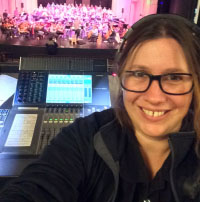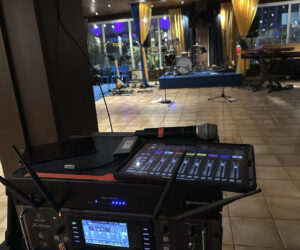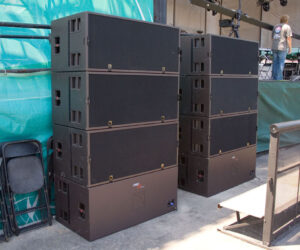Recently, I moved to a new city – Nashville – and needed to find a job in a new market with few contacts. Fortunately, I’ve spent the better part of two decades hustling for work as a freelancer, so I had some tricks up my sleeve.
In this article I’ll lay out the strategies and thought processes I used to land a gig. Whether you’re new to a city or new to the industry, these approaches can help start start you on the right path.
My goal is to tour more, which is what drove me to change locations. But while waiting for the bus, I wanted to build a home base for myself. So I simultaneously pursued leads for touring jobs while applying to clubs, music venues, and production companies.
I also set about building a local network because making cool friends who work in the industry is always one of my goals. Having multiple strategies makes finding a job more likely. There’s no shortage of applications for live sound reinforcement, so pursue any of them that you find interesting.
Getting Started
I began by telling my established network that I was changing my base of operations a few weeks before I moved. I put out a few social media posts, and reached out to my two friends who already lived here to see if they wanted to hang out. Among questions about which bars are the coolest, I asked if they could point me in a direction to look for work.
It’s worth noting that I did not outright ask them to hire me for anything. No one likes being put on the spot, and finding work is about having a lot of irons in the fire. I’m certain that if any of my friends could give me a gig they would. Networking is as much about exchanging information, like which companies are hiring or who to call for a gear rental, as it is about being on each other’s call lists.
While gleaning great insights from my friends, I was also researching production companies on my own. This is something you can do even if you’re just starting out. I searched the internet for “AV production company [location]” and made a list of every single one that I felt would be a good fit.
Then I approached each of them by phone or email or in person to inquire about job opportunities. I have a spreadsheet which lists the company, point of contact information, and when and how I contacted them. Considering I reached out to about 40 different companies and job listings in a little under three weeks, it was critical that I keep track of them – the last thing I wanted to do was contact the same company more than once because I forgot I had already done it.
Pretty soon other people in my network began reaching out to me about their own contacts. I was able to meet more people and make new friends. If someone couldn’t offer me a job, I still offered to buy them a beer. Some of those contacts will never directly offer me work, but I still win by having cool people to hang out with.
Finally, I broadened the type of work I was looking for. Initially, I was mainly contacting AV production companies and answering job postings for tours, but clubs and venues need people, too. Back home in Dallas when I needed to fill the calendar at the last minute, I would ask around at the clubs. There’s usually a sound tech who needs a night off, and having those lines of communication open had served me well over the years. I set out to recreate that in my new city.
I took a stroll through the main music district in town and met the people behind the consoles, and learned a lot very quickly about the unique culture of those spaces. I was very straightforward about what I was doing. I was honest about my skill level and my intentions. Not every job is for every person, so it was important to me to make sure I was the right person for the venue and vice versa.
If you’re first starting out, clubs are a great place to cut your teeth. And if you’ve been at this awhile, mixing at clubs is a great way to stay sharp. The rooms are often not ideal and the systems can be a little on the “home brewed” side of things. Troubleshooting, creative mixing and making changes on the fly are all a big part of what it takes to mix a band well in those spaces.
Keep In Mind
Now, I did run into a small bit of culture shock here, which I would caution anyone changing markets to expect. Where I’m from, and indeed most places I know of, clubs pay quickly, often cash or check in hand at the end of the night. That’s not how it works on Broadway in Nashville.
Those clubs are well-oiled machines that deserve their own articles. The upswing for me was that the application process is much the same as applying to work at a restaurant. While that might not be exactly what you run into in your town, be aware that there is generally some amount of adjustment any time you enter a new market.
There are some other things to keep in mind while looking for work. First, remember to be patient. Even if someone wants to hire you, they may not be able to do it right when you want them to. Be cool while you both wait for things to line up.
Networking is really the end all be all of the live sound world. But here’s the thing I wish someone had explained to me a very long time ago: networking is just as much about chilling and having a great time with someone as it is about furthering your professional goals. Having a solid network means having people around you that will think of you when something pops up that they can’t take themselves.
When you start out, you will be at the bottom of everyone’s call list. You never know, it may be you that ends up offering them work.
Not every opportunity that comes your way will be right for you. Don’t necessarily say yes to the first thing that comes along. If you feel that something isn’t going to be a great fit, think about putting forward a name from your network instead of getting into a situation where everyone will end up unhappy.
Follow up. Sometimes hiring managers are busy right when you talk to them, or the whole shop is busy working on an upcoming gig when you roll in with your resume. It happens. Don’t be afraid to call once in awhile and ask if someone has time to talk to you.
I followed up with one production company that was clearly all hands on deck the day I dropped by, and I was able to find out that they aren’t looking for anyone until August. That’s fantastic information, because now I know when to follow up again. (A note to hiring managers: Could you be kind enough to give us timelines so we don’t call you every week?)
Finer Points
That brings me to another big one: timing. There are ebbs and flows to live sound work. In North America, corporate AV and theatre tend to be busier in the winter, outdoor shows and festivals mostly happen in the spring and summer.
Some months, such as August and December, are just quiet all around. If you want to tour, start making those phone calls in late February or early March. Be aware of the best times to get a job for the type of work you want to pursue.
Finally, do your absolute best to stay positive. I know firsthand how agonizing it can be waiting for the phone to ring. It will. It did for me. (Well, my iPad dinged with a text message alert.)
It can be hard to get your foot in the door in the live events market, but don’t give up too quickly. And don’t be too proud to take a “small” gig or too impatient to wait for the right one. Some of the coolest gigs I’ve ever gotten have seemed to come out of nowhere when I wasn’t expecting them because I had laid the groundwork for that to happen.
One final word of advice I’ve given before, but bears repeating: bring snacks. You never know when you’ll need them. Good luck!














